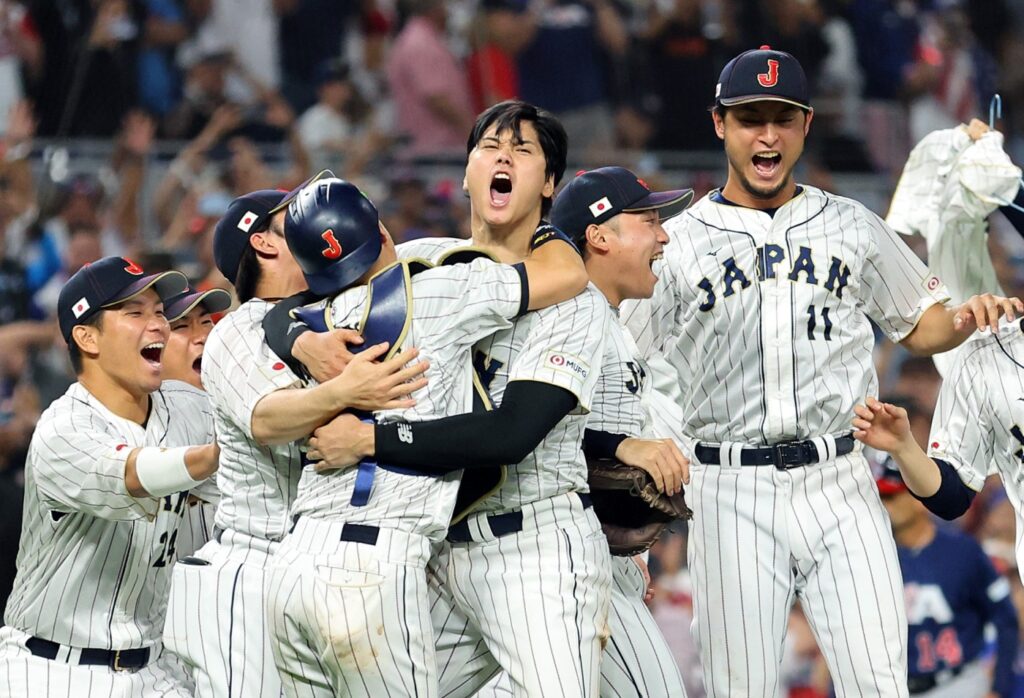
The Roman Catholic Council of Chalcedon convened in 451. The invited bishops established several doctrines that persist in the Christian and Catholic theologies to this day. One, promulgated by Pope Leo I, states that the Messiah has two distinct natures: divine and human.
The World Baseball Classic is bound to few traditions other than the absence of a pitch clock, but it imbued a messianic quality on Shohei Ohtani. After Japan’s dramatic victory over the United States in the championship game Tuesday, Ohtani was selected to the all-tournament team as both a designated hitter and a pitcher – two roster spots for one player.
The Most Valuable Player, naturally.
“Give Ohtani a billion dollars,” Chicago Cubs pitcher Marcus Stroman wrote on his Twitter account on Tuesday night. “Mythical unicorn god on the baseball field!”
To be considered a success, the WBC did not need Ohtani to strike out Mike Trout with a full count to end a 3-2 game. The tournament was littered with superhuman performances amid a surreal atmosphere from start to finish. To be considered a success, the WBC needed to showcase the best players in the world playing their hardest. For 14 days, that’s exactly what we got (with a few exceptions).
The exceptions included a disproportionate number of American pitchers. Their absence predisposed many American fans – inculcated from birth to view professional baseball and international competition as separate pursuits – to dismiss the WBC as a glorified sideshow featuring gerrymandered rosters. It was more than that, even if it’s fair to ask why Gerrit Cole, Jacob deGrom, Justin Verlander, and Max Scherzer (among others) spent the last two weeks in spring training while Ohtani, Yu Darvish and Roki Sasaki did not.
Ultimately, the tournament wasn’t determined by who didn’t play. The U.S. didn’t lose because it lacked good pitching. Merrill Kelly, Aaron Loup, Kyle Freeland, Jason Adam, David Bednar and Devin Williams held Japan to five hits and two solo home runs. Japan won because the U.S. went 0 for 7 with runners in scoring position on a night when Darvish and Ohtani were limited to one inning apiece.
The finale was a crisp, close game that ended with the two best players in the world – teammates on the Angels, coincidentally – dueling for the first time ever. If that doesn’t satisfy a WBC critic, nothing will. I just can’t imagine someone maintaining the dogmatic belief that loyalty to one’s spring training team should preclude any player from having that much fun for a couple of weeks in March.
Look, I get it: Money talks. Nine-figure major league contracts talk loudly. We can still ask them to shut up every three years.
Or every two years.
Or in a month other than March.
The idea of turning the WBC into a more central event on the baseball calendar might sound reactionary, but consider this: to weather the brewing storm created by the financial collapse of several regional sports networks, MLB needs to reposition its product as a global game. That requires a heavy lift. A sport that is already pricing out the children of working-class families in the U.S. cannot easily compete with soccer and basketball – not now, perhaps not ever.
The WBC represents just one pillar of MLB’s evolving global strategy, but it carries the greatest potential for overnight success. The need to grow the game is immediate; just look at the gloomy headlines this month involving MLB teams’ local television contracts. Diamond Sports Group, the nation’s largest owner of regional sports networks, filed for bankruptcy protection last week. Warner Bros. Discovery, which owns networks in Houston, Pittsburgh and Denver, announced its withdrawal from the RSN game in February.
Right now is a delicate moment. It’s suddenly both possible and practical to imagine a baseball calendar in which the traditional MLB spring training/regular season/All-Star Game/postseason format is not the best way to get the sport from Point A (with its focus on the MLB season and regional North American fan bases) to Point B (a global game with global stars, with the biggest games delivered with little friction to a global audience).
What might that look like?
• Hold the WBC at midseason, alternating with the All-Star Game. Coordinate schedules with the top leagues in Japan and Korea to ensure their countries’ best players are able to participate.
• Hold the WBC in November, after the World Series, when there are few conflicting events on the global baseball calendar.
• Hold the WBC every other year, using the off years to stage qualifier tournaments in places like Europe and the Middle East where the game is still taking a foothold.
Commissioner Rob Manfred is nothing if not broad-minded when it comes to rethinking the game. The MLB Players’ Association will deserve a seat at the table for these discussions too.
Both parties must keep in mind that no WBC might eclipse the near-perfect script this year’s tournament followed. Both Japan and the United States needed late-inning comebacks against Mexico and Venezuela (in the quarterfinals), respectively, to reach the championship game. The Dominican Republic would have made the final field of eight perfect. Injuries to Edwin Diaz and Jose Altuve dampened the fun but, in the end, Ohtani’s greatness washed over these blemishes.
And that’s the scary part: for the WBC to be the pillar of baseball’s global branding campaign, it has to establish that brand now, with Ohtani at his peak. The baseball messiah won’t be around forever.
Can one player turn baseball into a global sport where others have failed? That – more than where he’ll be playing next year – is the biggest question Ohtani invites.
